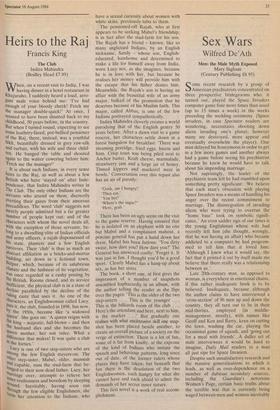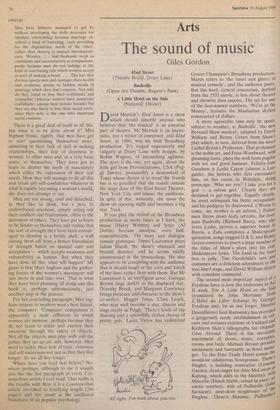Sex Wars
Wilfred De'Ath
Men: the Male Myth Exposed Mary Ifigham (Century Publishing £8.95)
Some recent research by a group of American psychiatrists concentrated on three prospective bridegrooms who, it turned out, played the Space Invaders computer game four more times than usual (up to 15 times a week) in the weeks preceding the wedding ceremony. (Space invaders, in case Spectator readers are wondering, necessitates shooting down aliens invading one's planet; however many are destroyed, more appear and eventually overwhelm the player). One man delayed his honeymoon in order to get in a few more games and another always had a game before seeing his psychiatrist because he knew he would have to talk about his impending marriage.
Not suprisingly, the , leader • of the psychiatric team felt he had stumbled upon something pretty significant: 'We believe that each man's obsession with playing Space Invaders was a means of handling his anger over the recent commitment to marriage. The disintegration of invading aliens who were trying to overrun the "home base" took on symbolic signifi- cance.' An even sadder sign of our times is the young Englishman whose wife had recently left him (she thought, wrongly, that he was having an affair) who became addicted to a computer he had program- med to tell him that it loved him: 'Although I knew what it would say, the fact that it printed it out by itself made me believe that there really was a relationship between us.'
Late 20th-century man, as opposed to woman, is everywhere in emotional chains, if this rather inadequate book is to be believed. Inadequate, because although the author claims to have interviewed a 'cross-section' of 96 men up and down the country, they all turn out to be in their mid-thirties, employed (in middle- management, mostly), with names like Geoff and Ken and Barry, keen on cutting the lawn, washing the car, playing the occasional game of squash, and 'going out for a meal with friends'. A duller set of male interviewees it would be hard to imagine, Daily Mail readers to a man all just ripe for Space Invasion.
Despite such unsatisfactory research and the massive generalisations to which it leads, as well as over-dependence on a number of dubious secondary sources, including the Guardian's notorious Women's Page, certain basic truths about the terrible war that is currently being waged between men and women inevitably
emerge:
Men have hitherto managed to get by without developing the skills necessary for intimate relationship because marriage in- volved a kind of bartering, each providing for the dependence needs of the other, rather than sharing in mutual interdepend- ence. Women. . . . find husbands inept as confidants and unsatisfactory as companions, partly because men do not indulge in the kind of soul-baring talk which women accept as part of making a bond. . . The fact that divorce upsets men and damages their health and resilience points to hidden needs in marriage which they don't express. Not only do they stand to lose their confidante and counsellor (whereas women have numerous confidantes among their female friends) but they' are also likely to lose their social circle, since their wife is the one who maintains social contacts.
There is a good deal of truth in all this, but what is to be done about it? Miss Ingham thinks, rightly, that men have got to start questioning themselves more, admitting to their lack of skill in making relationships, their fear of closeness to women, to other men and, in a very basic sense, to themselves. They have got to learn to shatter the myth of masculinity which stifles the expression of their real needs. How they will manage to do all this and retain any self-confidence whatever in what is rapidly becoming a woman's world, she does not attempt to say.
Men are not strong, cool and detached, as they like to think, but a prey to undeveloped emotions, simply acting out their conflicts and frustrations, often to the detriment of others. They have got to learn to be kinder to themselves and realise that the sort of strength they have been encour- aged to develop is a brittle shell, a wall cutting them off from a firmer foundation of strength based on mutual care and acceptance — which accepts weakness and vulnerability as human.. But when they have done all this, what will happen? My guess is that Mary Ingham and the gather- ing forces of The women's movement will just move in and take over. That is what they have been planning all along and this book is, perhaps subconsciously, just another step in the process.
For her concluding paragraph, Miss Ing- ham returns to modern man's best friend, the computer: 'Computer compulsion is apparently a male affliction to which women are immune, perhaps because they do not learn to relate and express their emotions through the safety of objects. Not all the objects men play with and the games they set up are safe, however. Men need to tackle their fear of trust, closeness and self-awareness not just so that they live longer. So we all live longer.'
Where have you read that before? No- where perhaps, although to me it sounds just like the last paragraph of every Cos- mopolitan article I ever read. That really is the trouble with Men: it is a Cosmopolitan article stretched to terrifying length (244 pages) and the result is the undiluted blandness of all popular psychology.







































 Previous page
Previous page